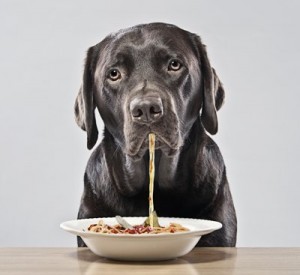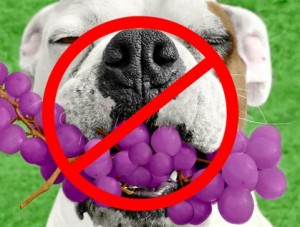Many pet parents do their best to ensure optimal health for their companion animals. Veterinary visits, exercise and diet play an integral role in pet health. Pet owners tend to be very selective when choosing commercial pet foods, but sometimes they’re less discerning when they offer scraps of their own food to pets.
It can be hard to resist the pleading eyes of a pet looking for a handout from the dinner table.  While it is generally fine to offer a tidbit here and there, even small amounts of certain foods can cause illness or even death, and pet owners are encouraged to familiarize themselves with foods that may be hazardous to pets.
While it is generally fine to offer a tidbit here and there, even small amounts of certain foods can cause illness or even death, and pet owners are encouraged to familiarize themselves with foods that may be hazardous to pets.
Some foods people eat can be toxic or even lethal to pets. Avocado, for example, contains persin, which can cause vomiting and diarrhea in dogs, according to the Gateway Animal Hospital. Birds and rodents are also sensitive to avocado poisoning.
Grapes and raisins are other seemingly healthy foods that can be harmful to pets. The toxin inside of these fruits is unknown, but grapes and raisins can cause kidney failure. Cyanide is present in the seeds/pits of plums, pears and peaches, making these fruits potentially hazardous as well.
 The ASPCA lists coffee, caffeinated products and chocolate as dangerous for pets as well. These items contain substances called methylxanthines that, when ingested by companion animals, can cause vomiting, panting, hyperactivity, tremors, and seizures. Dark chocolate is more dangerous than milk chocolate. Baking chocolate is the most toxic kind of chocolate to dogs.
The ASPCA lists coffee, caffeinated products and chocolate as dangerous for pets as well. These items contain substances called methylxanthines that, when ingested by companion animals, can cause vomiting, panting, hyperactivity, tremors, and seizures. Dark chocolate is more dangerous than milk chocolate. Baking chocolate is the most toxic kind of chocolate to dogs.
Foods and products artificially sweetened by xylitol will cause insulin release in many species, and this can lead to liver failure. Keep pets away from chewing gum, candy and toothpaste.
Common herbs like onions, chives and garlic can cause gastrointestinal irritation and may lead to red blood cell damage. Cats are more susceptible than dogs to these foods, but each species can be affected negatively.
Dog owners have frequently offered animal bones as a treat. However, these bones may harbor bacteria that can cause gastrointestinal illnesses. Furthermore, bones can splinter while they are being chewed, potentially lodging in the esophagus or intestines of the pet.
The following are some additional human foods and beverages that should not be given to pets:
* alcoholic beverages
* apple seeds
* hops
* macadamia nuts
* moldy foods
* mushrooms
* potato leaves and stems
* salt
* tea
* tomato leaves and stems
* yeast dough
* walnuts
